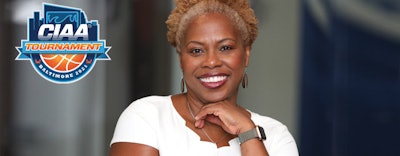
I can't help but wonder what Sen. Kamala Harris felt as she was elected the first Black and South Asian American vice president of the United States of America. It was the same curiosity I had about former President Barack Obama and first lady Michelle Obama. I still wonder what they felt about being the "firsts," acknowledged for their lifetime of preparation, work, sacrifice and passion for serving others — not just for being Black.
I am often asked my thoughts about being the first full-time Black woman commissioner of an athletic conference — the first among all NCAA divisions. More importantly, a Black woman commissioner of a conference founded in 1912 and historically managed and led by Black men, a conference where race and discrimination impacts our everyday existence as HBCUs.
As I watched Vice President Harris be sworn in, I thought about the celebration of 100 years of women's suffrage that was not inclusive of Black women until 1965 — 55 years after women were granted the right to vote. Black women were among the last Americans to have access to the vote. It took until January 21, 2021, to see the first woman, the first Black woman, and an HBCU graduate hold the second-highest position in the country. The swearing in of Vice President Harris was also the first opportunity for women and girls to see themselves in such a powerful political position.
Being the first at anything brings conflicting emotions, particularly when you just want the opportunity to show up every day and be your best self, drive change and make a lasting impact in every space you enter and exit. When I accepted my dream job as commissioner of the Central Intercollegiate Athletic Association on Sept. 6, 2012, I never focused on being the first Black woman commissioner of a conference that recently celebrated its 100th anniversary. I focused on returning home to my beginnings and being a leader who would build on the CIAA's mission, core values and rich tradition through college athletics.
My mission to serve others and transform experiences for CIAA student-athletes is based on my own experience as a former two-sport student-athlete at Hampton University. Being exposed to sports at all levels of the industry prepared me for the known and unknown challenges of being a Black woman in a position of power and leadership, not just in college athletics. I understood that I had to navigate the past to provide structure for the way forward — the politics to negotiate, and the human resources to identify the right team and partners — all while sustaining the symbolic value and recognition that the CIAA has across the nation. My role was not just about being the first, but also about the pressure to ensure that I was not the last.
This weighed heavily on me as I moved into a position that made me the face of a culture that means so much to so many. People love this conference, and they are invested in its success. The fear of failure and of disappointing my board, my family, my community, the student-athletes, the fans, the alumni and the sponsors was real. It changed me — from feeling excitement to feeling like an imposter. The exhilaration of being in my dream job became a nightmare. I was tackling personal and professional challenges all at once. It took time to build my confidence back with the support of my executive team, who reminded me that God did not put me in this position to fail and that this opportunity was his gift to me to serve in ways beyond what I could see.
Every year before and after the CIAA Tournament, I am in awe that I lead a conference with basketball as its centerpiece. The CIAA Tournament is an event that impacts a whole community and annually draws an average of 150,000 people, bringing $50 million of economic impact. The greatest gifts and talents of athletes, educators, executives, leaders, entertainers and activists have been a part of the CIAA's legacy, and my board has entrusted me to lead and protect our heritage as the conference commissioner. CIAA is for life. It is a place we call home and one that provides a sense of belonging.
I am not sure about other Black firsts, but I consider my experience as a Black woman with a platform, a position of influence and the responsibility to inspire and be present to support this valuable brand as "passion work" and service to my community. Being first in a role is meaningful. It took time for me to be comfortable with the attention, and to see myself as a role model, a game-changer and a part of history.
I consider myself a voice for the voiceless, an advocate, a negotiator and a servant-leader with the responsibility to ensure that the work I do every day as a community leader is impactful for the more than 3,000 student-athletes and 12 member institutions that have historical value to the Black community. My village and support system ensure that I can be a great commissioner and an awesome mom to my daughter, Samone. They remind me that I am valued, that I need to take care of myself, and that I should appreciate what is most important to me — my faith and my family.
I pray daily for the strength to stay focused on what matters most: to manage expectations, to be true to myself, and to be mentally healthy for a demanding position. Through hard work, commitment, preparation and dedication — and all the characteristics I learned as a college student-athlete — I am ready to serve and help position others for success. I recognize that I am a model for the next generation of women and girls. I know for sure that Black girls need to see that they belong and that neither Kamala Harris nor Jacqie McWilliams will be the last to fill their respective positions, because those young Black girls are next in line.
This article originally appeared in the April 2021 issue of Athletic Business with the title "First but not last: Opening doors for the next generation." Athletic Business is a free magazine for professionals in the athletic, fitness and recreation industry. Click here to subscribe.
































